“If You're Cynical About That, You're Watching the Wrong Show”: How Lee Corso and Kirk Herbstreit Forged the Sweetest Bromance in Sports
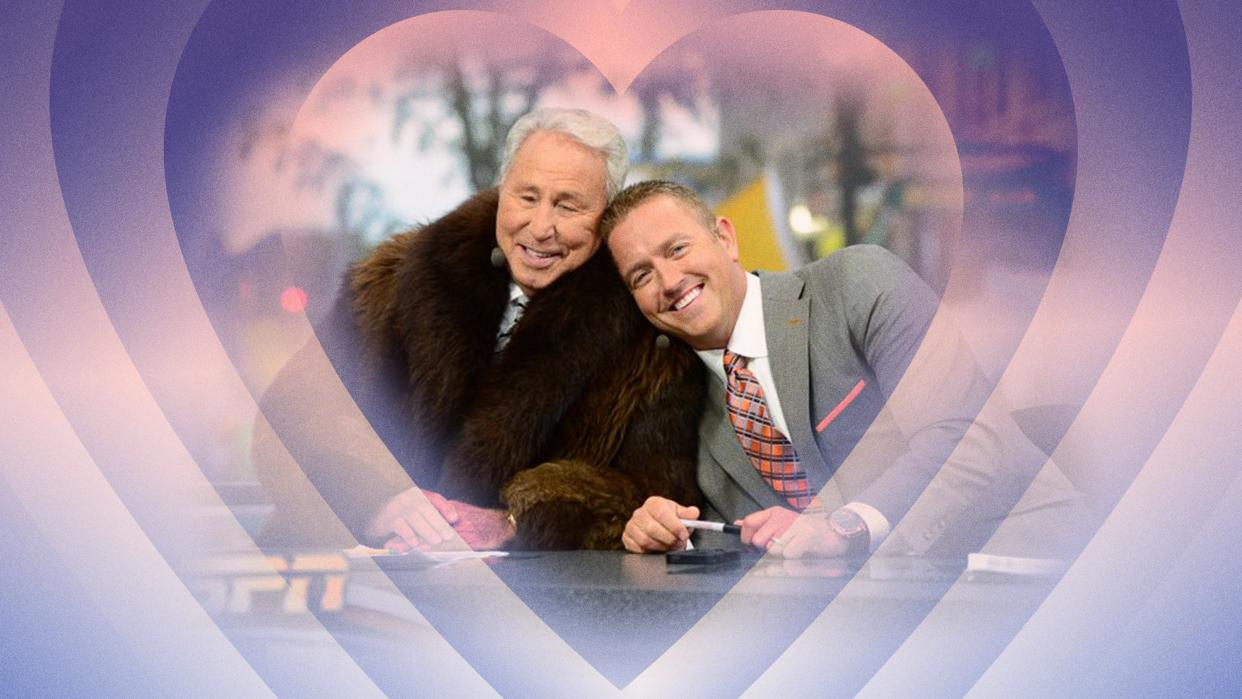
- Oops!Something went wrong.Please try again later.
- Oops!Something went wrong.Please try again later.
- Oops!Something went wrong.Please try again later.
- Oops!Something went wrong.Please try again later.
- Oops!Something went wrong.Please try again later.
- Oops!Something went wrong.Please try again later.
- Oops!Something went wrong.Please try again later.
This story was featured in The Must Read, a newsletter in which our editors recommend one can’t-miss GQ story every weekday. Sign up here to get it in your inbox.
When Kirk Herbstreit auditioned for an ESPN show called College GameDay in 1996, the show had a limited track record, and Herbstreit had almost none. He had played quarterback for Ohio State, where he was good enough to start by his senior year in 1992, but he was not a star. He did not play in the NFL, and in 1995 he picked up a gig as an ESPN sideline reporter.
At the time, Lee Corso was a college coach turned broadcaster who had established himself in the show’s early years. He remembered that Herbstreit sweated a lot during their first rehearsal together. The former coach saw something he liked, though: “I knew, when I first met him, that he would be a star in television.”
The young sportscaster did not know that. Herbstreit told me his primary thought when he auditioned was, “I can’t believe I’m sitting next to Lee Corso.”
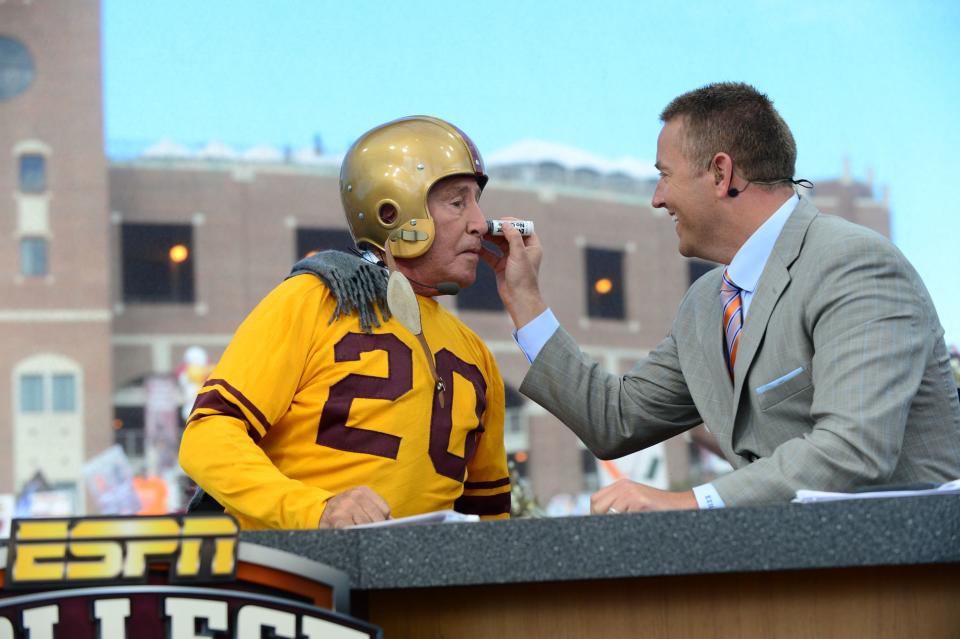
Corso Herby 3
Courtesy of ESPNTime proved Corso right. Herbstreit became one of ESPN’s biggest stars. He has a prominent chair on GameDay and teams with Chris Fowler in the company’s No. 1 booth for college games. Within about an hour of GameDay ending on Saturday morning, Herbstreit is in the air to wherever he’ll call a primetime game that night. ESPN accommodates his work as a color commentator on Thursday night NFL broadcasts for Amazon, which competes with ESPN in the NFL media world. Herbstreit, 54, has also voiced video games: before EA Sports’ NCAA Football series went on hiatus, Herbstreit called that one, too.
All the while, he has shared the GameDay desk on Saturday mornings with Corso, now 88. They are the enduring faces on a show that has become synonymous with those early hours for college football people.
ESPN is no longer the only channel to put on a big on-campus pregame show. (Fox’s Big Noon Saturday imitates and now competes hard with GameDay.) Herbstreit and Corso are hardly the only people to inform and entertain fans on Saturdays. But their journey together is exceptional, not just in its 28-year duration—an eternity in TV years—but in how many different roles Herbstreit and Corso have filled for each other. The Corso-Herbstreit relationship has defined almost all of College GameDay’s history, but the reason it works is not that ESPN could never find other people to talk ball before kickoff.
Instead, Corso and Herbstreit have thrived in large part because of each other. Their relationship appears on screen as one of the sweetest things in a cutthroat sport. Over the years, I have asked many people if life matches television—if these two men could really be as bonded as they seem. But the reality behind their on-screen relationship is more interesting: It was forged in production meetings, in back office chats that resembled therapy sessions, and on raucous GameDay sets. It withstood a stroke, a shifting cast of the show they’ve headlined for so long, and Herbstreit’s assumption of several other jobs that leave him with comically little free time. In talking with the men and people who have worked with them, I found that their relationship is not exactly like what I see on TV. It is sweet. But it runs deeper than most of us know.
“Maybe you could fake it for a few weeks, but, I mean, this has gone on for years,” said Gene Wojciechowski, a former ESPN and GameDay correspondent who co-wrote Herbstreit’s memoir. “It’s OK if you want to be skeptical, but if you're cynical about that, you're watching the wrong show.”
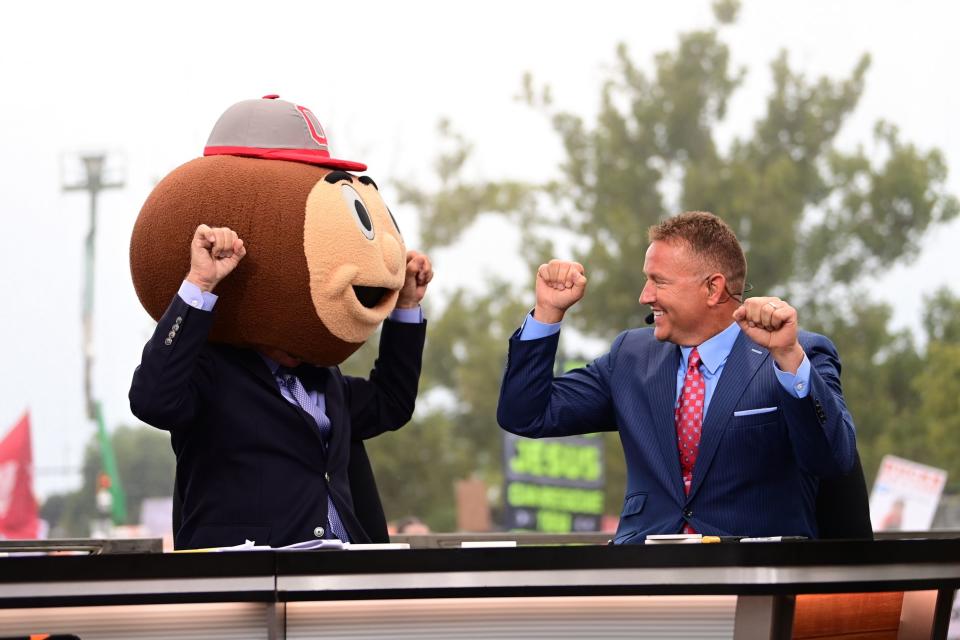
corso herby 1.jpeg
Courtesy of ESPN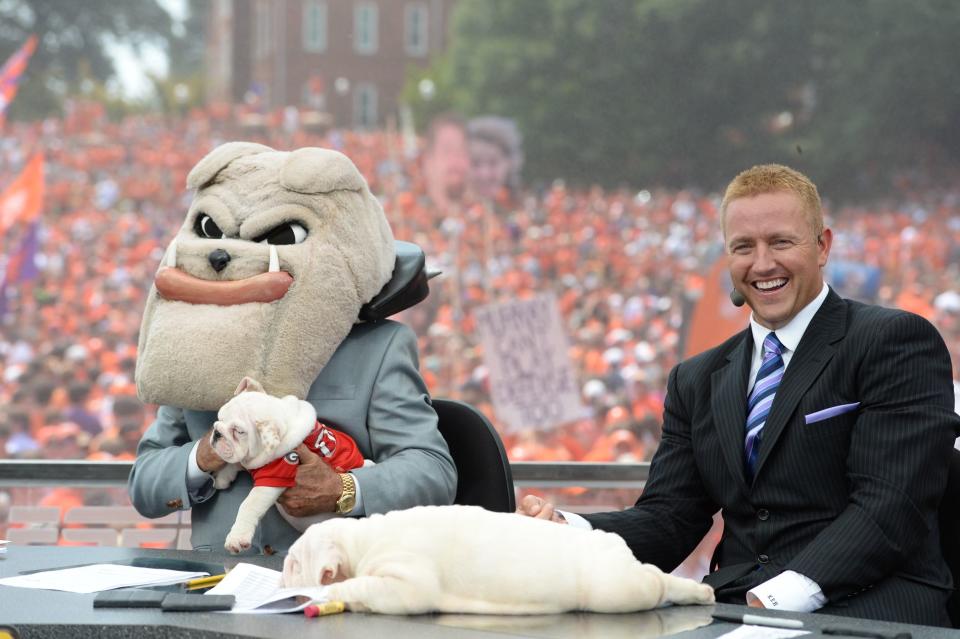
corso herby 2
Courtesy of ESPNWhen Herbstreit started on GameDay in the mid-’90s, he liked to get lost in playbooks. In meetings, and often on live TV, Herbstreit would embark on extended analyses of Xs and Os. Corso, despite a Division I coaching background, had little tolerance for the weeds. He would sit pensively for a while and then strike with precision. “He'd kind of raise his hand,” Herbstreit said, “and say, ‘Sweetheart, sweetheart, remember: We're in the entertainment business, and football is our vehicle.’ It was almost like Don Corleone talking. That's why I always say he's a mixture of Don Corleone and Yoda.”
Corso had a point about the necessity of being entertaining. People might watch GameDay for any number of reasons, but thousands show up in person at very early hours of the morning so that they can have a religious experience. A visit from ESPN’s cast and crew becomes a highlight of college for thousands of kids every week. Schools fall over themselves to host the show. GameDay’s cast and crew have no choice but to deliver week after week, flight after flight. Chris Fowler, the former GameDay host, told me, “There are times when you’re just dead-ass tired, and you haven't gotten proper rest, and you need to draw inspiration from that crowd, from each other, from the adrenaline of the setting. We do, and it never fails to happen.” The first time I ever saw Lee Corso in person was at the airport in Baton Rouge, Louisiana. It was 4:30 a.m. on a Sunday in 2019, hours after Joe Burrow’s LSU beat Florida. He had to be in Central Pennsylvania for a Penn State game a few days later. There, he’d egg on a different crowd.
Drew Gallagher, a longtime ESPN producer, told me, “Lee taught Kirk the value of entertainment.” That was of course useful for Herbstreit, but Corso’s advice on other matters was vital, too.
Early in his career, Herbstreit told me, he struggled to make sense of different directives. He would walk up to Corso, explaining that his agent had given him advice and he wasn’t sure if he should follow it. Corso did something perhaps rare in TV circles: he’d just chill. “He’s not interrupting. He’s listening,” Herbstreit said. After Herbstreit stopped, maybe 15 minutes later, Corso would start. “And then he just says two sentences, and you’re just like, ‘Oh.’”
“Our relationship really changed from just being colleagues,” Herbstreit said. He would go to Corso with questions about being a young father, and Corso would share lessons and wisecracks: “He was basically a second father to me or a relative of some kind. And the fact he listened. My dad didn't listen great. I loved him. It wasn't like my dad was abusive or not a great guy. He just had a really hard time being in the moment and listening. And I think that's why I valued that so much from Lee.”
Corso highlights a different sort of counsel he gave his younger coworker. “I tried to help him like he was my son, and I didn't really do too much in television,” he said. “The only thing I told Kirk Herbstreit was, ‘Don't ever give up GameDay, where people could see your face.’” After all, when Herbstreit calls games with Fowler or Al Michaels, the camera is pointed at the field. That could be anybody up there, Corso liked to remind him.
Herbstreit is one of the sport’s most connected people. He speaks often with high-powered coaches at big games. He must be the only man in college football who is allowed to bring his golden retriever, Ben, out to midfield right before kickoff at the University of Georgia, an institution that cares deeply about lawn care. (Corso and the dog get on well. “What's his name? Ben? I call him Max,” Corso noted.)
By contrast, Corso sees his own relative lack of connections as a great asset. “I have no personal relationship with any coaches, so therefore I can say anything I want, because I say the truth and I talk the truth,” Corso told me. “If it is objective, I say it. If it isn't, I don't say it. So I have one thing going for me. I don't talk to coaches one way or the other. I don’t talk to ‘em at all, and so I say what I think, and that’s it.”
For a while, that was Corso’s reputation: the shit-stirring ex-coach who became an entertainer. “Coaches got pissed off, and I think fans did too,” Fowler said. “There's such a passion in the sport that when he didn't pick their team and put on the other team's headgear, you're damn right they were upset with him.”
Corso still starts fights, though not as often. A big one unfolded in September, when Corso dubbed a game between Washington State and Oregon State the “No One Wants Us Bowl.” It sounded to many, including Washington State’s head coach, like he’d called it the “No One Watches Bowl,” which would’ve been an ugly descriptor for two schools abandoned when conference realignment all but killed the Pac-12.
Needless to say, if someone at a GameDay show got nasty with Corso, that would be ill-advised. “There probably would be a physical incident. The security guys would need to step in and hold Kirk back,” said Chris Fallica, the long-time researcher and producer for GameDay who now works on Fox’s competitor program, Big Noon Saturday. “That would not go over well. And I know if I were still there, I would certainly be involved in that as well. That's a hands-off topic for me.”
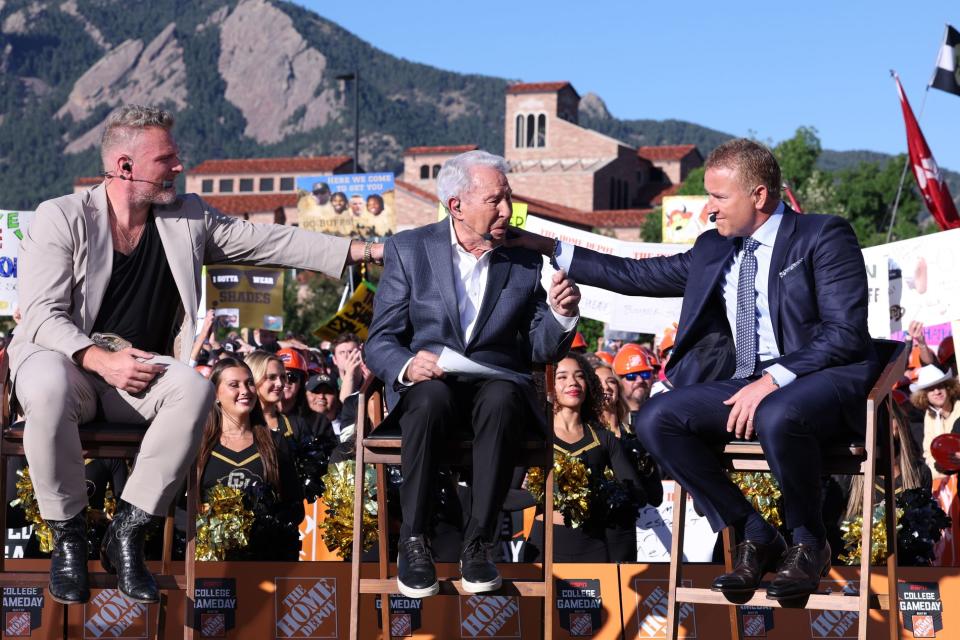
corso herby 5.jpeg
Courtesy of ESPNGameDay is not Corso’s only job: He is also director of business development for the pencil company Dixon Ticonderoga. It is not a merely ceremonial role—Corso keeps an office with the literal pencil pushers. At 88, Corso remains an engine, crisscrossing the country every week to put on a different mascot head and rile up college football fans in a way nobody else in the world can do.
Still, some things have changed with time. In 2009, he suffered a stroke; as a result, speech does not come as naturally as it did. He sometimes has to hunt for a while for the right words. “The doctor called me in and he said, ‘Lee Corso, you'll never be the same as you were before you had this stroke.’ And that’s true. So basically, sometimes, I need some help. I rely on Kirk to help me a lot of the time.”
Herbstreit has become Corso’s security blanket on air. It is a delicate dance, helping Corso through those moments without gratuitously drawing attention to the challenges of being an 88-year-old stroke survivor speaking on live TV, often off the cuff. The GameDay crew helps by passing on statistics and using cue cards, but it still falls to Corso hit his marks and share his opinions. “It really just comes full circle to his work ethic, going back to coaching days and all of that, of just staying very structured in his day-to-day,” Lindsey Lloyd, the managing producer who runs the GameDay operation, said.
The hiccups come anyway, some weeks more frequently than others. Occasionally, Corso will stall as he makes a point. Gradually, that became Herbstreit’s cue, sitting one seat over—not to cut off the man who taught him about entertainment, but to help him keep things moving. Sometimes the handoff is choppy; sometimes you barely notice it. But the dynamic plays out with dignity each time.
“I don't want to ever make it look like he needs help or ever make it look like he's struggling,” Herbstreit said. “So I just try to do whatever I can subtly to just try to be there for him.”
Their story is circular. “When Kirk first got into the business, Coach looked out for him and sort of protected him and helped him,” Wojciechowski said. “And now here we are all those decades later, and Kirk is sort of doing the same for Coach. And so it really is a beautiful symmetry.”
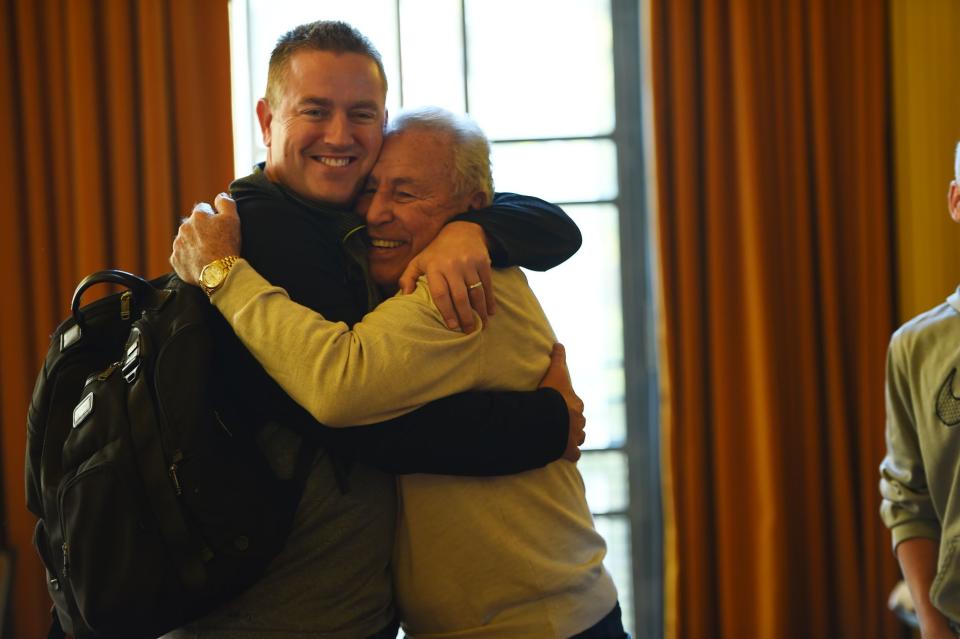
corso herby 6.jpeg
Courtesy of ESPNCorso would like to do the show as long as ESPN will have him. “I’m gonna be like that guy in Vaudeville,” he told me. “They hook him around the neck, and they pull him off the stage as he keeps talking.”
I asked Lloyd if she thinks about what the show might look like when Corso takes his leave, and what that could mean, and she told me, “I do, but I don't know if it's appropriate for me to answer that.” ESPN and Corso have mutual reverence for one another; Corso believes he owes the company a lot for standing by him post-stroke. I have not yet found an ESPN or GameDay staffer who does not want Corso around in perpetuity.
But it’s not only Corso who has been in his role forever. Herbstreit has also done GameDay for longer than he thought he would. He told me he “never could have imagined” that he’d do the show without Fowler, who gave up his spot to Rece Davis in 2015. Herbstreit said he had the same thought about Fallica and former producer Lee Fitting, both of whom are now gone from ESPN. Herbstreit added he is in the second year of a five-year contract that runs through the 2026 season. He feels at ease with GameDay’s current team, too: Davis, Pat McAfee, Desmond Howard, and more. “The vibe of it and what it feels like is a little different than it used to be, but society's different,” he said. “The consumer is different than it used to be. So I'm not envisioning leaving the show right now, and I just hope that I'll continue to love it the way I love it right now.”
His collaboration with Corso has driven much of that enjoyment. Their pairing was a natural fit and remains so. “Kirk had played the game, and Coach had played the game and coached the game, and Kirk was a child of football,” Wojciechowski said. But there have been lots of children of football in the media. Herbstreit and Corso shared something else from the start: Each had made a career in the college game, but neither was such a star that being on TV, let alone staying there, felt like a birthright. Corso found his footing, and as Herbstreit looked for his own, the veteran tried to keep him from slipping. Over nearly three decades on air, Corso's trust has paid off.
“I experienced college football at the highest level at Ohio State, but I wasn't a Heisman winner,” Herbstreit said. “I didn't win a national championship. I mean, ‘Who am I to come on this show?’ That's how in my brain I felt." Corso, of course, helped shift his thinking: "This guy treated me like I earned the right to be there.”
Originally Appeared on GQ

